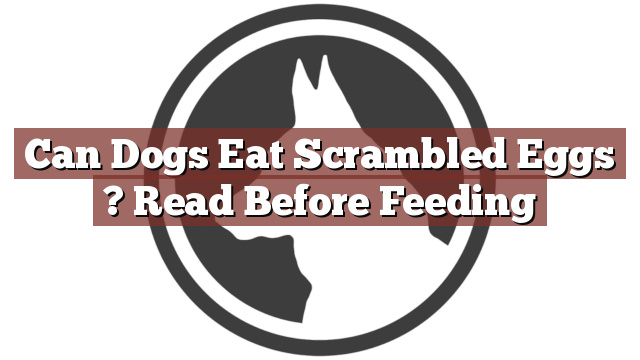Understanding Your Dog’s Dietary Needs
As pet owners, it is essential to understand our dogs’ dietary needs to ensure their overall health and well-being. While dogs are primarily carnivores, they can also benefit from certain fruits, vegetables, and even some human foods in moderation. However, it is crucial to be aware of the potential risks and benefits of introducing new foods into their diet.
Can Dogs Eat Scrambled Eggs? Read Before Feeding
Can dogs eat scrambled eggs? This is a common question among dog owners who want to offer their furry friends a varied diet. The answer is a resounding yes. Scrambled eggs can be a healthy and nutritious addition to your dog’s diet, but as with any new food, it is crucial to introduce it gradually and in moderation.
Eggs are an excellent source of protein and can provide various essential vitamins and minerals for your dog. They contain high-quality proteins that can aid in muscle development and repair. Additionally, eggs are rich in vitamin B12, riboflavin, and selenium, which are all essential for a healthy dog’s diet.
Pros and Cons of Feeding Scrambled Eggs to Dogs
Feeding your dog scrambled eggs can have numerous benefits, but it is also important to consider any potential drawbacks. Let’s explore the pros and cons of introducing this human food into your dog’s diet.
Pros:
-
Protein Powerhouse: Scrambled eggs are an excellent source of protein, which is essential for your dog’s muscle growth and overall well-being.
-
Nutritional Boost: Eggs contain essential vitamins and minerals that can support your dog’s immune system and contribute to a healthy coat and skin.
-
Digestive Health: Eggs are easy for dogs to digest and can be beneficial for those with sensitive stomachs or gastrointestinal issues.
Cons:
-
Allergies: Some dogs may have allergies or sensitivities to eggs, resulting in digestive issues or skin irritations. It is crucial to monitor your dog’s reaction when introducing eggs into their diet.
-
Cholesterol Concerns: While eggs are a healthy source of protein, they also contain cholesterol. If your dog has specific dietary restrictions or underlying health conditions, it is best to consult with your veterinarian before adding eggs to their diet.
Conclusion: Weighing the Risks and Benefits of Eggs in Your Dog’s Diet
In conclusion, scrambled eggs can be a nutritious and healthy addition to your dog’s diet. However, it is important to keep in mind that every dog is different, and what may work for one dog may not work for another. Before introducing scrambled eggs or any new food into your dog’s diet, it is always recommended to consult with your veterinarian.
By carefully monitoring your dog’s reaction to scrambled eggs and introducing them gradually, you can assess if they are a suitable addition to their diet. Remember to feed eggs in moderation and watch out for any adverse reactions. A balanced and varied diet, tailored to your dog’s specific needs, will ensure their optimal health and well-being.
Thank you for taking the time to read through our exploration of [page_title]. As every dog lover knows, our furry friends have unique dietary needs and responses, often varying from one canine to another. This is why it's paramount to approach any changes in their diet with caution and knowledge.
Before introducing any new treats or making alterations to your dog's diet based on our insights, it's crucial to consult with a veterinarian about [page_title]. Their expertise ensures that the choices you make are well-suited to your particular pet's health and well-being.
Even seemingly harmless foods can sometimes lead to allergic reactions or digestive issues, which is why monitoring your dog after introducing any new food item is essential.
The content provided here on [page_title] is crafted with care, thorough research, and a genuine love for dogs. Nevertheless, it serves as a general guideline and should not be considered a substitute for professional veterinary advice.
Always prioritize the expert insights of your veterinarian, and remember that the health and happiness of your furry companion come first.
May your journey with your pet continue to be filled with joy, love, and safe culinary adventures. Happy reading, and even happier snacking for your canine friend!

